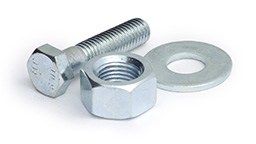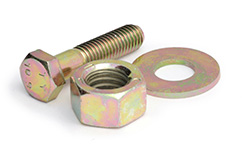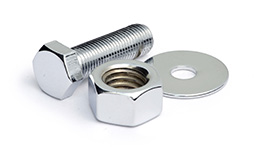Fasteners are manufactured from a variety of materials such as steel, stainless steel, aluminum, brass, bronze, copper, nickel, titanium and other non-ferrous metals, plastics and exotic materials. The selection of materials ought to take into account several factors, including but not limited to the required strength, stresses, corrosive environment, weight, magnetic characteristics, electrical conductivity, required coatings or platings, reusability, and expected life.
Because different materials differ in terms of strength, brittleness, corrosion resistance, galvanic corrosion qualities, and, of course, cost, the fastener material can be significant when selecting a fastener.
Materials
Steel


Over 90% of fasteners are made from steel because of its inherent strength properties, excellent workability and relative cheapness as compared to other materials. Steel that is used to manufacture fasteners falls into 3 types – low carbon, medium carbon and alloy steel.
Steel is the most common fastener material. Steel fasteners are available plain as well as with various surface treatments such as zinc plating, galvanization, and chrome plating.
Stainless Steel
Stainless steel is an alloy of low carbon steel and chromium for enhanced corrosion characteristics. Stainless steel is highly corrosion resistant for the price. Because the anti-corrosive properties are inherent to the metal, it will not lose this resistance if scratched during installation or use.
There is a widespread misperception that stainless steel is more durable than ordinary steel. In actuality, heat treatment cannot be used to harden many stainless steel alloys because of their low carbon content. Therefore, the stainless alloys utilized in bolts are much weaker than hardened steel fasteners but marginally stronger than unhardened steel when compared to normal steel. Stainless fasteners have a tendency to galling, or seizing up during installation, if considerable care is not followed.
Most stainless steel fasteners are much less magnetic than regular steel fasteners though some grades will be slightly magnetic.
Silicon Bronze
Silicon bronze, often referred to simply as bronze, is an alloy made mostly of copper and tin with a small amount of silicon. Bronze is used primarily in marine environments. It is preferred over stainless in wooden boat construction and re-fastening due to its superior corrosion resistance, and over brass due to its higher strength. Bronze is similar to copper in color and is also sometimes seen in fine woodworking where it is used for its appearance. The main drawback of bronze is its high cost.
Brass
Brass is an alloy of primarily copper and zinc. Brass is highly corrosion resistant and electrically conductive. However, its use as a fastener is somewhat limited due to its relative softness. It is used primarily for its appearance.
Aluminum
Aluminum is a light, soft, corrosion resistant metal. Like stainless steel, aluminum's corrosion resistance is inherent to the material. Therefore, scratches and nicks will not effect the corrosion resistance.
Fasteners are made from a variety of aluminum alloys, with elements such as manganese, silicon, iron, magnesium, zinc, copper, and silicon being added to increase strength and melting point.
Coatings
Zinc Plating
Many steel fasteners are electroplated with zinc for better corrosion resistance. Fasteners that have been zinc plated have a shiny, silvery or golden appearance, referred to as clear or yellow zinc respectively. They are fairly corrosion resistant but will rust if the coating is destroyed or if exposed to a marine environment.
Hot Dip Galvanizing
Galvanizing is another coating involving the application of a layer of zinc. Hot dip galvanizing puts the thickest possible coating on the metal, resulting in superior corrosion resistance. Due to the thickness of the coating hot dipped galvanized bolts are not compatible with other nuts. Galvanized nuts are tapped slightly larger than other nuts to accommodate this coating.
Hot dipped galvanized fasteners are frequently used outdoors, especially in coastal environments.

Chrome
Fasteners are chrome plated and polished for appearance. Chrome plating provides similar corrosion resistance to zinc plating. The main drawback of polished chrome is its high cost. If more corrosion resistance is required, stainless steel may be chrome plated, preventing any corrosion should the chrome be penetrated.






